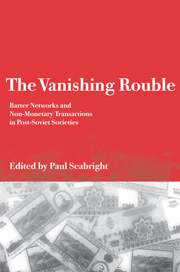Book contents
- Frontmatter
- Contents
- List of figures
- List of tables
- List of boxes
- Preface
- List of contributors
- Introduction: barter networks and ‘information islands’
- I Theory
- II Large-scale empirical studies
- III Ethnography
- 10 How is barter done? The social relations of barter in provincial Russia
- 11 Shadow barter: economic necessity or economic crime?
- 12 Surrogate currencies and the ‘wild market’ in Central Siberia
- 13 Bear skins and macaroni: the social life of things at the margins of a Siberian state collective
- Conclusion: what is to be done?
- Index
10 - How is barter done? The social relations of barter in provincial Russia
Published online by Cambridge University Press: 05 May 2010
- Frontmatter
- Contents
- List of figures
- List of tables
- List of boxes
- Preface
- List of contributors
- Introduction: barter networks and ‘information islands’
- I Theory
- II Large-scale empirical studies
- III Ethnography
- 10 How is barter done? The social relations of barter in provincial Russia
- 11 Shadow barter: economic necessity or economic crime?
- 12 Surrogate currencies and the ‘wild market’ in Central Siberia
- 13 Bear skins and macaroni: the social life of things at the margins of a Siberian state collective
- Conclusion: what is to be done?
- Index
Summary
Introduction
This chapter will present evidence from two regions of Russia, one close to Moscow and one in Eastern Siberia, to explore the role of trust in barter relationships.
It has been argued (Anderlini and Sabourian, 1992) that although immediate face-to-face barter requires a minimum of trust, the problem of the ‘coincidence of wants’ means that this kind of barter is difficult to achieve and is a relatively rare occurrence in practice. Therefore barter is more likely than a monetised system to require delays in payment and several exchanges before the transactors are satisfied. This is particularly the case in an agricultural economy, where goods are produced season- ally yet consumption is a year-round constant. The transaction costs of barter are considerably reduced if it can be repeated with the same partners season after season. In such a situation, the practice of barter requires trust at the micro level, as sellers have to wait for returns and trust that the goods they receive will be of the agreed quantity and quality. It also encourages reliable behaviour, since demonstrated unreliability results in the cutting off of previous relations and all the costs of searching for new ones. This chapter asks to what extent these ideas are relevant to the situation in contemporary Russia, and in particular what are the implications of barter for social relations (both between partners and in networks).
- Type
- Chapter
- Information
- The Vanishing RoubleBarter Networks and Non-Monetary Transactions in Post-Soviet Societies, pp. 259 - 297Publisher: Cambridge University PressPrint publication year: 2000
- 6
- Cited by



